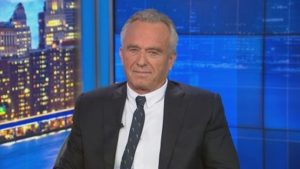The rising influence of Robert F. Kennedy Jr. in Washington is set to prompt major transformations in the health and food sectors, inciting concern among corporate lobbyists about the impact of his proposed regulatory changes.
RFK Jr. Sparks Potential Overhaul in Health and Food Regulations

RFK Jr. Sparks Potential Overhaul in Health and Food Regulations
Kennedy's proposed reforms raise alarm among industry leaders, foreshadowing significant shifts in food and health policies.
Kennedy's ambitious agenda includes stricter regulations on pesticides and a thorough analysis of vaccine safety data, sending shockwaves through various industries. The corporate landscape is buzzing with anxiety as the implications of these proposals could put billions in revenue at risk. A proposed ban on highly processed foods in schools and a comprehensive rework of federal regulatory agencies underline the seriousness of his intentions, challenging established norms that many companies have relied upon for years.
At K Street, a hub for lobbying firms, there is a palpable sense of confusion as companies scramble to decode Kennedy's expanding influence. “The atmosphere is one of caution,” says John Strom, special counsel at Foley and Lardner. He noted that lobbyists advise clients to adopt a restrained approach—steering clear of confrontation to avoid alienating Kennedy at this pivotal moment.
The potential repercussions of Kennedy’s reforms are substantial. Stricter pesticide rules could threaten the agricultural sector, and prohibiting ultra-processed foods in educational settings could disrupt existing food supply chains. Additionally, revisiting vaccine safety could stir further unease in an already beleaguered health sector, which is trying to stabilize its footing amid evolving regulatory demands.
As the health and food industries gear up for what could be a seismic shift, many are looking to strengthen ties with Kennedy to mitigate any adverse effects. This strategic pivot highlights the priority of a collaborative approach, as companies remain wary of triggering a hostile relationship with the influential figure.
With President Trump's recent actions further amplifying Kennedy's proposals, industries affected are in a state of trepidation. Lobbying firms are experiencing a surge of inquiries as their clients seek assistance in navigating these impending changes. The specter of sweeping regulatory reforms looms large, leaving the future of the health and food sectors in a state of heightened uncertainty.
At K Street, a hub for lobbying firms, there is a palpable sense of confusion as companies scramble to decode Kennedy's expanding influence. “The atmosphere is one of caution,” says John Strom, special counsel at Foley and Lardner. He noted that lobbyists advise clients to adopt a restrained approach—steering clear of confrontation to avoid alienating Kennedy at this pivotal moment.
The potential repercussions of Kennedy’s reforms are substantial. Stricter pesticide rules could threaten the agricultural sector, and prohibiting ultra-processed foods in educational settings could disrupt existing food supply chains. Additionally, revisiting vaccine safety could stir further unease in an already beleaguered health sector, which is trying to stabilize its footing amid evolving regulatory demands.
As the health and food industries gear up for what could be a seismic shift, many are looking to strengthen ties with Kennedy to mitigate any adverse effects. This strategic pivot highlights the priority of a collaborative approach, as companies remain wary of triggering a hostile relationship with the influential figure.
With President Trump's recent actions further amplifying Kennedy's proposals, industries affected are in a state of trepidation. Lobbying firms are experiencing a surge of inquiries as their clients seek assistance in navigating these impending changes. The specter of sweeping regulatory reforms looms large, leaving the future of the health and food sectors in a state of heightened uncertainty.























